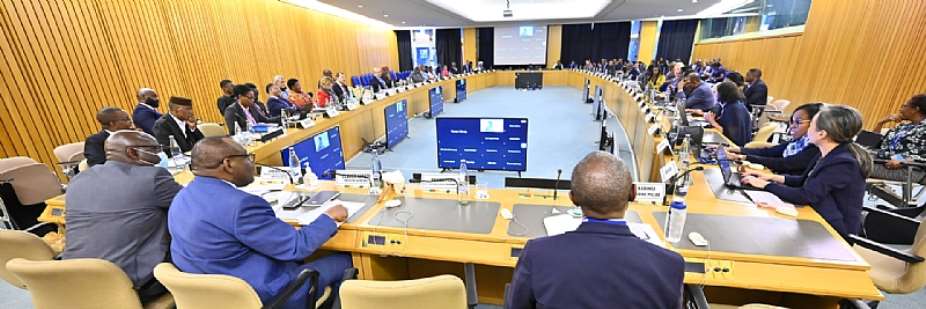Addis Ababa, 18 December 2023 (ECA) - The Economic Commission for Africa (ECA) has concluded its annual and fourth quarter (Q4) Accountability and Programme Performance Review Meeting (APPRM) and preparation of the 2024 Annual Business Plan under the theme: Reflecting on 2023 achievements and lessons learned and planning for impactful delivery of the 2030 Agenda for Sustainable Development and Agenda 2063: the Africa We Want, in 2024. The annual review is a key component of the institution’s reflection and planning process on its activities with its member states and partners.
Organised by the ECA’s Strategic Planning, Oversight and Results Division (SPORD), the four day meeting was held in hybrid version in Addis Ababa, Ethiopia on December 17 – 15, under the leadership of the ECA Executive Secretary, Claver Gatete.
Mr. Gatete acknowledged the work done by staff as the institution’s most important resource and stressed “the need to build linkages, enhance collaboration and strengthen partnerships as these are key for the achievement of the sustainable development and Africa’s transformational agendas.”
“More emphasis is needed on creating better interfaces between social policy and macro-economic policies; between energy and industrialization and economic diversification, with the key experts working across the various workstreams and with partners and the private sector to achieve this,” he stressed.
Said Adejumobi, Director of SPORD and lead organizer of the annual review said, “Rescuing the SDGs and Agenda 2063 will be a major focus of the work of the Commission in 2024, hence the AU Second Term Year Implementation Plan (STYIP) of the African Union, the UN six transitions and Summit of the Future should frame the ECA’s research tracks and its Medium-Term Programme Framework (MTPF).”
He also underscored the importance of the ongoing horizontal collaboration between the ECA subregional offices in furtherance of the decisions of previous APPRM meetings, stressing the need for this collaboration to be intensified, with more programmatic collaboration in areas such as migration, industrialization, private sector development/SMEs, among others. There would be greater effort to establish communities of practice on the common areas of work.
Mr. Adejumobi encouraged staff to study and internalise the newly revamped Programme, Project Management Manual that will systematically align processes, systems, behaviour and practice of ECA with the standards and principles of the UN Results-Based Management strategy.
Looking forward to 2024, ECA through its various divisions will focus on areas of interventions that will ensure progress on the achievement of the two agendas such as inclusion of The African Continental Free Trade Area (AfCFTA) in the SDG country frameworks, conduct research/analysis on issues of governance, peace and security and a deeper focus on sustainable development in Africa’s transformation. Data and statistics will continue to play a central role as will the need for upscaling technologies and innovation.
“For an inclusive and sustainable development and a climate resilient continent, ECA will support countries implement initiatives that harness new technologies and innovation and work with member states on strengthening their capacity in production, dissemination and use of credible data, statistics and geospatial information,” agreed the meeting.
In support of AfCFTA implementation, focus will be on strengthening regional cooperation and integration among countries through increased trade flows, improved industrialization and increased investment.
ECA will also continue to provide advisory services to member states, facilitate collaboration and ensure coherence at regional, sub-regional and national levels through an integrated approach under all its research tracks that include strengthening macroeconomic policy, boosting the implementation of AfCFTA, enhancing resilience through climate action and energy just transition.
Among the many achievements discussed, it was highlighted that member states have used ECA’s macroeconomic model in their development of national policy documents including national development plans, debt strategies, GDP analyses and high level policies. Countries are also using ECA’s tools and techniques for estimating fiscal capacity and city GDPs.
“If we collaborate with the other stakeholders, governments and the private sector with a focus on results and delivering as one, we can be sure that we shall achieve both Agendas,” said Mr. Gatete adding the need to increase peer-learning and best practices between member states to move together as a continent.
For more on ECA’s impact, watch the following playlist on the ECA YouTube Channel: ECA end of year Review - 2023 APPRM





 Azumah Nelson faces Irchad Razaaly in a match to empower youth
Azumah Nelson faces Irchad Razaaly in a match to empower youth
 Ejisu By-Election: I’m not a traitor, NDC people appreciate me – Independent can...
Ejisu By-Election: I’m not a traitor, NDC people appreciate me – Independent can...
 Some people expect us to be dogmatic, sycophantic supporters of Akufo-Addo even ...
Some people expect us to be dogmatic, sycophantic supporters of Akufo-Addo even ...
 NDC Campaign: James Agyenim Boateng is the right man to handle communications
NDC Campaign: James Agyenim Boateng is the right man to handle communications
 Mahama pledges to contribute to the development of Gonja Kindom
Mahama pledges to contribute to the development of Gonja Kindom
 “Ghanaman Time”: We've normalized the abnormal, accepted the unacceptable — Dots...
“Ghanaman Time”: We've normalized the abnormal, accepted the unacceptable — Dots...
 Bawumia begins nationwide campaign, starts in Eastern Region today
Bawumia begins nationwide campaign, starts in Eastern Region today
 Bawumia kicks off nationwide campaign with “bold solutions” for Ghana's future
Bawumia kicks off nationwide campaign with “bold solutions” for Ghana's future
 You cannot choose your successor; it’s only God who can – Mahama to Akufo-Addo
You cannot choose your successor; it’s only God who can – Mahama to Akufo-Addo
 Ejisu by-election: Vote for independent candidate Kwabena Owusu Aduomi to uphold...
Ejisu by-election: Vote for independent candidate Kwabena Owusu Aduomi to uphold...
